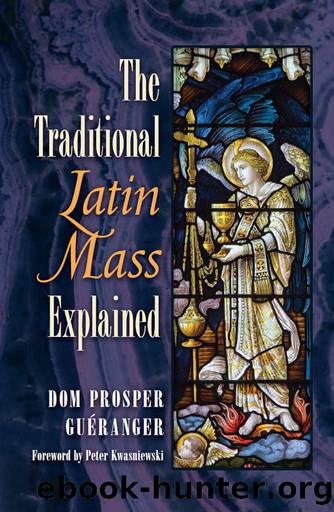The Traditional Latin Mass Explained by Dom Prosper Gueranger

Author:Dom Prosper Gueranger [Gueranger, Dom Prosper]
Language: eng
Format: epub
Tags: 2019b Uncategorized
Publisher: Angelico Press
Published: 2018-01-12T05:00:00+00:00
SANCTUS
The Trisagion is the hymn heard by Isaias when favoured with a vision of Heaven, and later by Saint John also, as he relates in his Apocalypse (4 : 8). The Church could not well have placed this song of Heaven at the beginning of the Mass, whilst we were just confessing ourselves sinners before God and the whole celestial court. What, then, is it the angels say? Sanctus, Sanctus, Sanctus, Dominus Deus Sabaoth. They celebrate the sanctity of God. And how do they celebrate it? In a manner the most complete; they use the superlative, saying thrice over that God is truly holy. We meet with the song Trisagion in the Te Deum also: Tibi Cherubim et Seraphim incessabili voce proclamant: Sanctus, Sanctus, Sanctus, Dominus Deus Sabaoth.
Wherefore is it that God is thus expressed by the triple affirmation of holiness? Because holiness is the chief perfection of God: God is Holy by Essence.
In the Old Testament even, this angelic cry was already made known: the Prophet Isaias heard it; in the New Testament, John, the Beloved Disciple, names it in his Apocalypse. So then, God is indeed holy, He delights in revealing this to us. But, to holiness is added yet more still: Sanctus Dominus Deus Sabaoth, holy is the Lord, the God of armies; this is like saying: Deus Sanctus et fortis, God, the Holy and the strong. So here we have two things in God, sanctity and strength. This expression Deus Sabaoth or Deus exercituum, the God of armies, is used, because nothing gives such an idea of strength, as an army surmounting all obstacles, laughing at difficulties, and overriding all that comes in its way: thus is the strength of God vividly expressed. So then, God is holy and strong. This angelic song has received the name of the Trisagion, which is derived from Agios, holy, and from tris, three: God, the thrice holy.
In the Old Testament a notion of the Holy Trinity was hereby conveyed, as though it stood thus: holy is God the Father, holy is God the Son, holy is God the Holy Ghost. But in order to catch a glimpse of this truth, it was needful to be learned in the understanding of the Scriptures; hence, hardly any but the Doctors of the Law could come at this knowledge; or, again, in prayer, God would sometimes vouchsafe to reveal this Truth to privileged souls, in whom He deigned to enkindle his Light. Among the Jews, such favoured souls were always to be found.
After confessing the holiness and strength of God, the Church adds: Pleni sunt coeli et terra gloria tua. There is no way, more magnificent than this, of expressing the Glory of God; verily there is no nook or corner of Creation where shines not forth the Glory of God; everything is produced by His Power, and everything gives Him Glory. Holy Church transported on beholding this, cries out aloud: Hosanna in excelsis. We read in the Sacred Scriptures that this
Download
This site does not store any files on its server. We only index and link to content provided by other sites. Please contact the content providers to delete copyright contents if any and email us, we'll remove relevant links or contents immediately.
| Book of Common Prayer | Catechisms |
| Devotionals | Hymns & Hymnals |
| Meditations | Monasticism & Asceticism |
| Pentecostal & Charismatic | Prayerbooks |
| Rites & Ceremonies | Sacraments |
The Secret Power of Speaking God's Word by Joyce Meyer(3220)
More Language of Letting Go: 366 New Daily Meditations by Melody Beattie(3030)
To Light a Sacred Flame by Silver RavenWolf(2823)
How Proust Can Change Your Life by Alain De Botton(2814)
Anxious for Nothing by Max Lucado(1975)
A TIME TO KEEP SILENCE by Patrick Leigh Fermor(1912)
Curse Tablets and Binding Spells from the Ancient World by Gager John G.;(1862)
The Gnostic Gospel of St. Thomas by Tau Malachi(1798)
7 Secrets of Divine Mercy by Vinny Flynn(1746)
all by Unknown Author(1682)
365 Tao: Daily Meditations by Ming-Dao Deng(1622)
From Good Goddess to Vestal Virgins: Sex and Category in Roman Religion by Ariadne Staples(1574)
100 Days of Thanks by Thomas Nelson(1570)
To Ride a Silver Broomstick by Silver RavenWolf(1569)
Anam Cara by John O'Donohue(1563)
The Fasting Edge by Jentezen Franklin(1539)
To Stir a Magick Cauldron by Silver RavenWolf(1523)
The Sacred Enneagram by Christopher L. Heuertz(1430)
New Morning Mercies by Paul David Tripp(1396)
